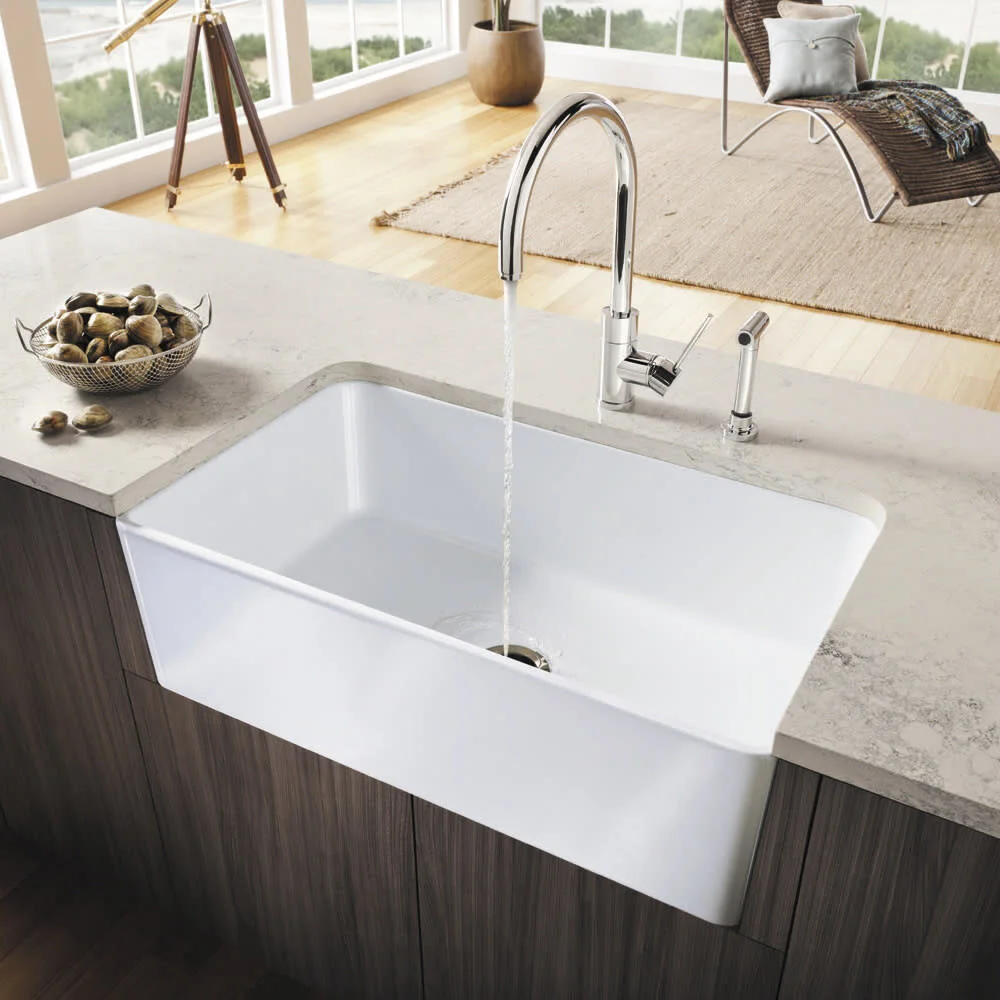If you love the lustrous look and practicality of porcelain, you’ll be glad to know that grout is out. The modern porcelain countertops are made, not from tiny squares, but full-size slabs big enough for an island. They come in a wide variety of color, pattern and finish combinations, some unique to porcelain, others that simulate marble, cement, wood, and more. How are these porcelain slabs made, how do they compare to natural stone, and how much do porcelain countertops cost?
Quartzite: The Natural Stone You Need to Know
Vitreous China Sinks: Don't Overlook a Classic
How Difficult Is Removing Etch Marks From Marble?
Do My Granite Countertops Need Resealing?
Trying to find out how often to reseal granite countertops can be confusing. You may hear recommendations ranging from every three months to every five years or more. The truth is, there is no one-size-fits-all answer, but here is some vital information you should know before you buy granite countertops or if you have granite that may need resealing.
Dekton: Won’t Freeze, Won’t Burn, And You Can Cook or Walk On It
Fireclay Sinks: Are They Worth the Price?
Because they’re nonporous, fireclay sinks have no nooks and crannies where germs and odors can set up house. Maintenance is easy: a daily wipe-down with a spot of mild dish soap and soft rag or sponge does the trick. If a stain persists, experts recommend a little baking soda or mild abrasive cleaner. With proper care, a fireclay sink will continue to add beauty and value to your house for years.
What Is the Best Reason for Choosing Granite Composite Sinks?
BEAUTIFUL AND DURABLE, granite composite sinks have become a popular alternative to stainless steel. But what exactly is granite composite? How does it hold up under the demands of a busy kitchen? And most important, what’s the best reason for choosing a granite composite sink?
What is Granite Composite?
Granite composite is not a solid block of granite but rather a combination of crushed stone and resin molded under intense pressure. The result is a sink that’s harder and heavier than raw granite and, unlike granite, is nonporous. That means granite composite, unlike its natural counterpart, is as hygienic as quartz and does not require sealing. Composite can also be engineered in a variety of designer colors.
How Does Granite Composite Hold Up?
You would expect a material that’s denser than natural granite to resist chips, scratches, stains and heat. Granite composite does all those things admirably and can easily handle the demands of the normal family kitchen. However, no material is invincible; even Superman has his Kryptonite.
Extreme heat can damage or blemish granite composite, so it’s not recommended to place a scalding-hot pan or liquid in the sink. That being said, Blanco guarantees its Silgranit composite sinks up to 536 degrees Fahrenheit, so temperatures would have to reach way beyond normal or even safe to harm a quality sink.
Ammonia-based cleansers or bleach, as well as steel wool and abrasive sponges, can damage the look of a granite composite sink and mineral deposits can cloud the finish. It’s recommended to clean the sink every day with gentle soap or baking soda and a soft sponge, then rinse and wipe with a soft cloth to keep it looking bright and fresh.
What’s the Best Reason for Choosing Granite Composite?
It’s simple: colorful granite composite looks terrific. To be able to coordinate your sink — normally one of the less-lovely parts of the kitchen — with your new granite, quartz, or specialty countertops is a tremendous perk. Granite composite’s durability and strength is just icing on the cake.
Although WilgusIQ offers a wide variety of sinks, we are proud to feature top-quality Blanco Silgranit granite composite sinks. To see a sample of available models and colors, please click here or the button below.








